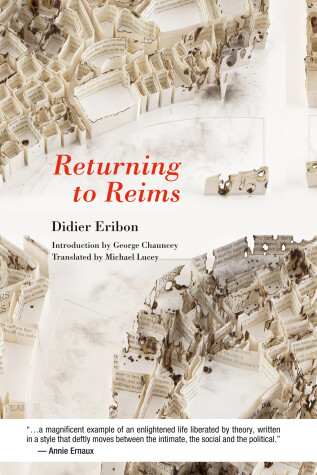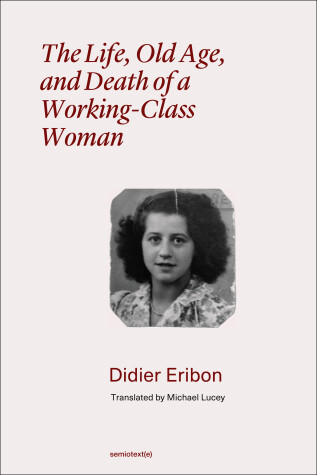Semiotext(e) / Foreign Agents
2 total works
On thinking the matter through, it doesn't seem exaggerated to assert that my coming out of the sexual closet, my desire to assume and assert my homosexuality, coincided within my personal trajectory with my shutting myself up inside what I might call a class closet.
—from Returning to Reims
After his father dies, Didier Eribon returns to his hometown of Reims and rediscovers the working-class world he had left behind thirty years earlier. For years, Eribon had thought of his father largely in terms of the latter's intolerable homophobia. Yet his father's death provokes new reflection on Eribon's part about how multiple processes of domination intersect in a given life and in a given culture. Eribon sets out to investigate his past, the history of his family, and the trajectory of his own life. His story weaves together a set of remarkable reflections on the class system in France, on the role of the educational system in class identity, on the way both class and sexual identities are formed, and on the recent history of French politics, including the shifting voting patterns of the working classes—reflected by Eribon's own family, which changed its allegiance from the Communist Party to the National Front.
Returning to Reims is a remarkable book of sociological inquiry and critical theory, of interest to anyone concerned with the direction of leftist politics in the contemporary world, and to anyone who has ever experienced how sexual identity can clash with other parts of one's identity. A huge success in France since its initial publication in 2009, Returning to Reims received enthusiastic reviews in Le Monde, Libération, L'Express, Les Inrockuptibles, and elsewhere.
A few years ago, Didier Eribon’s mother entered a retirement home. Over the course of several months, she lost her physical and cognitive autonomy, and despite his resistance, Eribon and his brothers were compelled to place her in a nursing home. The doctor had warned that she’d rapidly decline. And indeed, refusing the degradation and humiliation of her condition, Eribon’s mother died just a few weeks later.
In The Life, Old Age, and Death of a Working-Class Woman, Eribon furthers the archeological, historical, sociological, political, and personal reflection he began with Returning to Reims, this time to look at the question of old age. How does our society treat the elderly, especially the very elderly? What are the daily humiliations the elderly are forced to suffer? What are the conditions at the end of life?
Threaded through an erudite engagement with the works of Simone de Beauvoir, Annie Ernaux, Albert Cohen, Michel Foucault, Norbert Elias, and many others, the question of old age is shown here as a limit concept of Western thought and political philosophy. What is the place of bodies that can no longer assemble, discuss freedom, or protest? How do we hear those who can no longer say “us”? What does it mean not to project into the future? Can the absolutely dependent speak for themselves—and if not, who can speak for them?
Eribon left behind his prejudiced working-class family to become an intellectual. Looking back on his relationship with his mother, he transmutes his rage, sadness, and shame over her death into a portrait of being reunited beyond unbridgeable difference.

